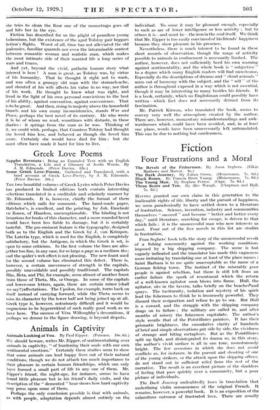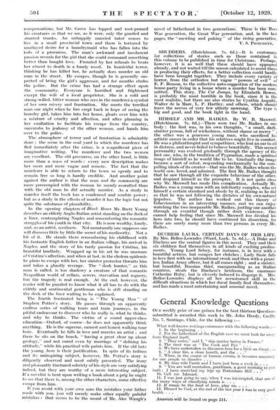Fiction
Four Frustrations and a Moral
7s. 6d.)
HAVING granted our own claim in this generation to the inalienable rights of life, liberty and the pursuit of happiness, we seem paradoxically to have settled down to a literature of frustration. Science, invention, industry and communities themselves " succeed " and become " better and better every day," until literature, searching for escape, is driven to that which fails : it is the unsuccessful man who now interests As most. Four out of the five novels in this list are studies in frustration.
Frau Seghers' book tells the story of the unsuccessful revolt of a fishing community against the working conditions imposed by a big shipping company. The scene is but vaguely indicated and the translator has made this vagueness more irritating by translating one at least of the place names Saint Barbara is to me quite unacceptable as the name of a German fishing town. The instinct of the miserably poor people is against rebellion, but there is still left from an earlier failure the spark of resentment which the return of a well-known agitator soon blows into flame. Hull, the agitator, sits in the tavern, talks briefly on the beaches`and quays. The taciturnity, isolation and mystery of his spirit lead the fishermen to think he is immensely powerful. They discard their resignation and refuse to go to sea. But Hull is a coward, and the struggle with the shipping company drags on to failure ; the military are called in, and after months of misery the fishermen capitulate. The author's style recalls that of the Pointillistes painters. It has their prismatic brightness, the cumulative clarity of hundreds of brief and simple observations put side by side, the vividness of strange and biting metaphors. But as the Pointillistes split up light, and disintegrated its drama so, in this story, the author's vivid surface is all in one tone, monotonously bright. The few occasions in which she does not avoid conflicts as, for instance, in the pursuit and shooting of one of the young strikers, or the attack upon the shipping offices, do not stand out in sufficient relief from the rest of the narrative. The result is an excellent picture of the shudders of feeling that pass quickly over a community, but a poor picture of individuals.
The Dark Journey undoubtedly loses in translation that underlining violin sensuousness of the original French. It remains, however, a powerful book. It is an exposition of the calamitous- outeome- of frustrated love-. There are usually compengatiOns, but Mr. Green has lopped and root-pruned his. creatures so that we see, as it were, only the gnarled and stunted trunks. An unhappily married tutor comes to live in a small provinCial town and there is tortured by unallayed desire for a laundrymaid who has fallen into the toils of a procuress. The man's awkward and incoherent passion reveals for the girl that she could command something better than bought love. Frenzied by her refusals he beats her almost to death in a lonely wood. In homicidal terror, thinking he has. killed her, he actually does murder an old man in the street. He escapes, though he is generally sus- peeted of being the girl's aggressor, and for months eludes the police. But the crime has had a strange effect upon the community. Everyone is horrified and frightened except the wife of a local proprietor. She is a cold and strong-willed, hitter woman who sees in the murderer a symbol of her own misery and frustration. - She meets the terrified man one night when he has crept back in hope of seeing the laundry girl, takes him into her house, gloats over him with a mixture of cruelty and affection, and after planning in her exultation to facilitate his escape from the country, succumbs to jealousy of the other woman, and hands him over to the- police.
The atmosphere of terror and of frustration is admirably done ; the scene in the coal yard to which the murderer has fled immediately after the crime, is a magnificent piece of imaginative writing. The murderer and the two women are excellent. The old procuress, on the other hand, is little more than a mass of words : every new description makes her more and more vague and remote. The fact that the murderer is able to return to the town so openly and to remain free so long is hardly credible. And another point against the author is that the man and the community are more preoccupied with the woman he merely assaulted than with the old man he did actually murder. As a study in Murder itself the book has a condensed and sombre 'power ; hut as a study in the effects of murder it has the logic but not (Mite the substance of plausibility. In the opening chapters of Black Roses Mr. Brett Young describes an elderly Anglo-Italian artist standing on the deck of a liner, contemplating Naples and remembering the romantic struggles of his youth in that city. He is now wealthy, lonely, and, as an artist, mediocre. Not unnaturallyone supposes one will discover little by little the secret of his mediocrity. Not a bit of it.. He stands there remembering his childhood with his fantastic English father in an Italian village, his arrival in Naples, and the story of' his tardy passion for Cristina, his beautiful landlady. Wrapped up in his art he was unaware of Cristina's affection, and when at last, in the cholera epidemic he plans to escape with her, her sinister protector thwarts-him and takes a ghastly revenge. The " dark hunter," as this man is called, is 'too shadowy a creature of that. romantic Neapolitan world of cellars, sewers; starvation and roguery, but the tragedy is real enough. At the end, however, the reader will be puzzled to know what it all has to do with the eldtrly and sentimental gentleman who is still standing on the deck of the liner waiting to be explained.
The fourth frustrated being is " The Young Man " of Stephen Potter's story. He passes through an apparently endless series of walking tours and train journeys, in the pitiful endeavour to discover who he really is, what he thinks, and why he thinks. The victim of a sound upper-class education—Oxford, of course—he does not apparently think anything. He is the supreme, earnest and honest walking tour bore. Eventually he falls in love and marries an artist ; and there he sits on the beach, " having a great clear up about geology," and not cured even by marriage of " defining his attitude," while his practical wife paints.him. If the old hate the young, here is their justification. In spite of its tedium and its uninspiring subject, however, Mr. Potter's story is diligently observed and most subtly presented. The irony and pleasantly tinctured sobriety of his style are very satisfying indeed, but they are worthy of a more interesting subject. If a novelist is bent upon writing a book about a prig he ought to sec that there is, among the other 'Characters, some effective - cseape ftorn . . -
If you avoid with your own sons the mistakes your father made with you, you will merely make other equilly mistakes : that seems to be. the moral of Mr. Alec Waugh's
• novel Of fatheilbod in two generatioti. There-is 'the ttoer War generation, the Great War generation, and, in the last
pages, the "mewling and puking of the rising generation, _ .
V. S. PliITCHETT.









































 Previous page
Previous page